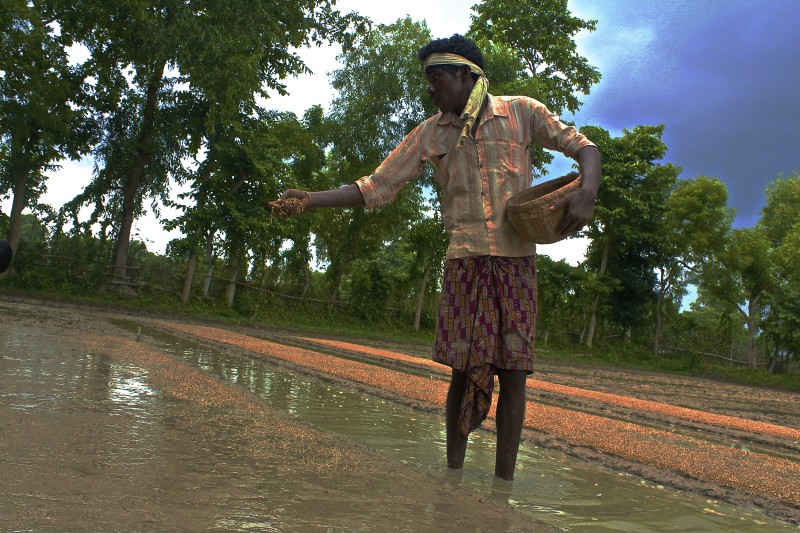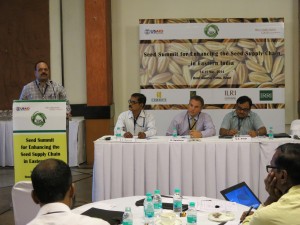Designing Solutions to Improve Delivery of High-Yielding Varieties to Farmers in Eastern India

Expanding the role of agricultural extension and advisory services would help promote new varieties to farmers Photo: Ashok Rai/CSISA
Seed Scenario
In recent decades, a large number of rice and wheat varieties have been released in India, which have the potential to significantly increase agricultural productivity and reduce rural poverty. However, most small-scale and poor farmers in eastern India do not have access to new generations of modern rice and wheat varieties that can tolerate flooding or are resistant to pests and diseases, and give higher yields.
Seed replacement rates in key crops like rice and wheat are extremely low in eastern India, which can be attributed to many factors. Farmers are not aware of the potential of new varieties; lack of proper seed storage infrastructure to maintain good quality; poor linkages among government, private sector and farmers to provide seeds in a timely manner and a lack of a policy environment that will support faster adoption of new varieties.
“Some of the concerns that need to be addressed in this sector include why farmers are still buying old (but popular) varieties from the market, how to ensure that more farmers can access seed markets and how to bridge the gap between demand and supply,” said Takashi Yamano, Senior Scientist and Agricultural Economist, International Rice Research Institute (IRRI), highlighting the scope and purpose of the meeting entitled, ‘Seed Summit for Enhancing the Seed Supply Chain in Eastern India’, organized by the Cereal Systems Initiative for South Asia (CSISA), funded by the U.S. Agency for International Development and the Bill & Melinda Gates Foundation, on 14-15 May in Patna, Bihar. The event touched on topics such as better-targeted subsidies on seeds, improved storage infrastructure, the policy environment and stronger extension systems to increase farmers’ accessibility and adoption of improved seed varieties.
More than 60 seed experts from the government, research and private sectors identified the challenges in the seed value chain and discussed actionable solutions that will improve the delivery of improved rice and wheat varieties to farmers in eastern India.
The event was divided into several plenary and group discussion sessions that focused on strengthening the financial capacity and marketing
skills of rural seed dealers and input retailers, expanding the role of agricultural extension and advisory services, leveraging civil society — farmers’ associations, community groups and non-governmental organizations — to help promote new varieties and encouraging greater engagement from India’s vibrant private sector in the region’s seed markets.
David Spielman, Senior Research Fellow, International Food Policy Research Institute (IFPRI), said, “India is the fifth largest seed market in the world, growing at 12 percent annually.” He underscored the gaps in the policy environment of India’s seed market and how public and private sectors need to work together for farmers’ benefits.
“There is a need for better decision-making tools – better data, information and analysis at a strategic level to improve seed systems and markets in Asia. Greater investments in the research systems and improved market surveillance to identify and prosecute fraudulent seed production are also required,” Spielman added.
Vilas Tonapi, Principal Scientist (Seed Science and Technology), Indian Agricultural Research Institute, promoted alternative seed system models – individual farmer as a seed bank, village-based seed banks and self-help group-based small scale seed enterprises – to provide local platforms that farmers can easily access to buy improved seeds. Tonapi also emphasized the importance of public-private collaborations to make available appropriate varieties at the right place and time, in sufficient quantity and good quality.
Looking Forward
The last session at the summit discussed the priorities for a future action plan in the Indian seed sector, especially in the eastern states. Participants highlighted the role of local seed dealers and the need for workable business models to expand the use of varieties. Defining which varieties are old and which are not is equally important. Participants also explored strategies to prioritize breeding, enhance varietal turnover and market development for the procurement of open pollinated varieties and hybrids.
Four main priorities came up at the end of the deliberations that will be critical going forward. Extension systems should be restructured and revived. Effective seed subsidy programs should be designed that are based on evidence, are cost-effective and are better targeted to reach poor farmers. Mechanization of the seed sector should be promoted with the introduction of mobile seed treatment units and seed weighing machines. Demonstrations of new varieties and new farm technologies should be promoted through progressive and innovative farmers.
Sain Dass, Indian Maize Development Association President, said, “Proper infrastructure, local production and sale to ensure timely availability, better extension services and more demonstrations to increase farmers’ awareness will help enhance the seed supply chain in eastern India.”
Read media coverage of the Seed Summit
View photos from the Seed Summit
Watch video: Using Super Bag for Better Storage of Seeds

